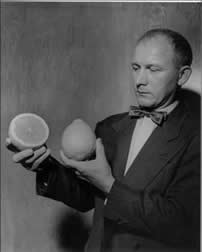

|

|
IN MEMORIAM
Willard P. Bitters
Professor of Horticulture, Emeritus
Riverside
1915-2006
Born in Eau Claire, Wisconsin, in June, 1915, Dr. Willard “Bill” Bitters earned his bachelor’s degree in biology from St. Norbert College and his master’s degree and Ph.D. from the University of Wisconsin. After earning his doctorate, he first worked as the superintendent of the Valley Research Farm of the University of Arizona in Yuma, and joined the Citrus Experiment Station, in Riverside in 1946 as a Horticulturist. In 1961, Dr. Bitters became a professor in the newly established University of California-Riverside.
His initial assignment was to work on horticultural aspects of tristeza, a serious vector-transmitted virus disease which threatened to destroy California citrus orchards. Tristeza was already in California and spreading in 1946. At that time most citrus trees in California were grafted on a rootstock that was known to be susceptible to tristeza. Dr. Bill Bitters was responsible for screening of over 500 cultivars to determine which rootstock-scion combinations were resistant to this disease and yet possessed suitable horticultural characteristics. Of the 500 screened, most were susceptible, but several successful ones were selected and released to the industry. Among these were ‘Troyer’ citrange and Citrus macrophylla, which continue to be important rootstocks worldwide. The industry greatly benefited by such releases. Another important contribution was his developmental work with ‘Flying Dragon’ trifoliate rootstock, which is able to dwarf most standard cultivars by 90 percent, making them easier to harvest.
Perhaps Dr Bitters’ most important contribution was his work with the Citrus Variety Collection. Herbert John Webber, the first director of the Citrus Experiment Station, had initiated and overseen the Citrus Variety Collection up until his death in 1944. When Dr. Bitters became the curator of the collection in 1947, it had been somewhat neglected. Dr. Bitters was instrumental in increasing the number of accessions in the collection from 600 to 1200. This collection is still recognized as one the major collections of citrus genetic resources in the world. During his time working with the Citrus Variety Collection, Dr. Bitters traveled extensively throughout the citrus growing regions of the world. He became known as a world authority on citrus scion and rootstock cultivars, and was well versed in many other areas of citriculture. Dr. Bitters was the author of 99 publications of significant benefit to citrus researchers and growers throughout the world. In 1967, Dr. Bitters received the Annual Citrograph Award in recognition of his many outstanding contributions resulting in the utilization of rootstock and scion varieties that produce improved tree growth and fruit quality.
After his retirement in 1982, Dr. Bitters continued to work with other University of California, Riverside researchers to improve the quality of the Citrus Variety Collection, advise others working in citriculture, and to serve the public through the University of California Cooperative Extension Master Gardeners Program.
He was a member of many academic organizations, including the American Society of Horticultural Science, the International Society of Citriculture, the Japanese Society of Horticultural Science, and the California Lemon’s Men’s Club.
Tracy L. Kahn
Carol J. Lovatt
Robert R. Krueger
Jodie S. Holt